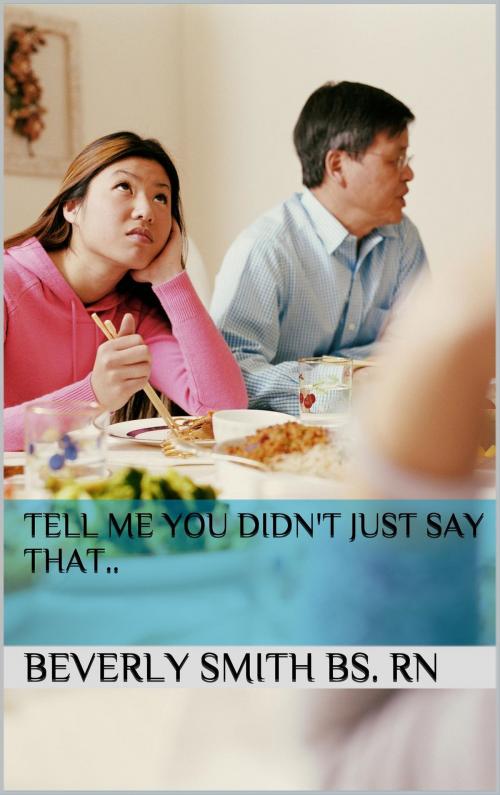| Author: | B. A. (Beverly) Smith | ISBN: | 9781311242440 |
| Publisher: | B. A. (Beverly) Smith | Publication: | May 1, 2014 |
| Imprint: | Smashwords Edition | Language: | English |
| Author: | B. A. (Beverly) Smith |
| ISBN: | 9781311242440 |
| Publisher: | B. A. (Beverly) Smith |
| Publication: | May 1, 2014 |
| Imprint: | Smashwords Edition |
| Language: | English |
As a Nurse I am constantly surprised that my caseload is not overrun with cases of Human Hoof & Mouth disease. It is not healthy to put your foot in your mouth every time you open it.
As a psychiatric Nurse, I often find myself worrying less about my patients, and more about those “normal and well” individuals. I keep trying to convince myself that they don’t mean to trivialize another’s pain, that surely what they said is not what they meant to say. If you are talking with a person that is depressed or suicidal, I beg you to think before you speak. Be thoughtful about giving advice and the words you choose. Hardly a shift goes by that I am not struck by the statements that people make; when I don’t go “please tell me you didn’t say that” and have to ask what the individual intended to say or ask them to tell me what they were thinking when they said that. Then rush on to check on my patient; too many of which can’t manage one more, real or perceived, blow.
To trivialize a person’s pain with platitudes is cruel and unnecessary, whether done intentionally or unintentionally. To purposely set out to say cruel and hateful things is simply sick. Often it is not so much the words that are used as how they were said; sarcastic, uncaring or worse. The tone of voice and the context in which they were used; often destroy any intended benefit to the person hearing them. Sometimes it is better to listen and say nothing. As momma said: If you can’t say something nice, then keep your say nothing while you think..
I can tell you that this human hoof and mouth disease can strike anyone at any time; there is no group of people that are immune. But take heart, it is a very treatable disorder and responds well to a little information and practice on engaging the mind before opening the mouth. Remember it is how our words are received that makes a difference. Please while you read these; think about how you would feel. Here is my collection of 193 of those statements; that all too frequently make a depressed or suicidal person feel worse.
Beverly Smith AA, BS, RN
As a Nurse I am constantly surprised that my caseload is not overrun with cases of Human Hoof & Mouth disease. It is not healthy to put your foot in your mouth every time you open it.
As a psychiatric Nurse, I often find myself worrying less about my patients, and more about those “normal and well” individuals. I keep trying to convince myself that they don’t mean to trivialize another’s pain, that surely what they said is not what they meant to say. If you are talking with a person that is depressed or suicidal, I beg you to think before you speak. Be thoughtful about giving advice and the words you choose. Hardly a shift goes by that I am not struck by the statements that people make; when I don’t go “please tell me you didn’t say that” and have to ask what the individual intended to say or ask them to tell me what they were thinking when they said that. Then rush on to check on my patient; too many of which can’t manage one more, real or perceived, blow.
To trivialize a person’s pain with platitudes is cruel and unnecessary, whether done intentionally or unintentionally. To purposely set out to say cruel and hateful things is simply sick. Often it is not so much the words that are used as how they were said; sarcastic, uncaring or worse. The tone of voice and the context in which they were used; often destroy any intended benefit to the person hearing them. Sometimes it is better to listen and say nothing. As momma said: If you can’t say something nice, then keep your say nothing while you think..
I can tell you that this human hoof and mouth disease can strike anyone at any time; there is no group of people that are immune. But take heart, it is a very treatable disorder and responds well to a little information and practice on engaging the mind before opening the mouth. Remember it is how our words are received that makes a difference. Please while you read these; think about how you would feel. Here is my collection of 193 of those statements; that all too frequently make a depressed or suicidal person feel worse.
Beverly Smith AA, BS, RN















